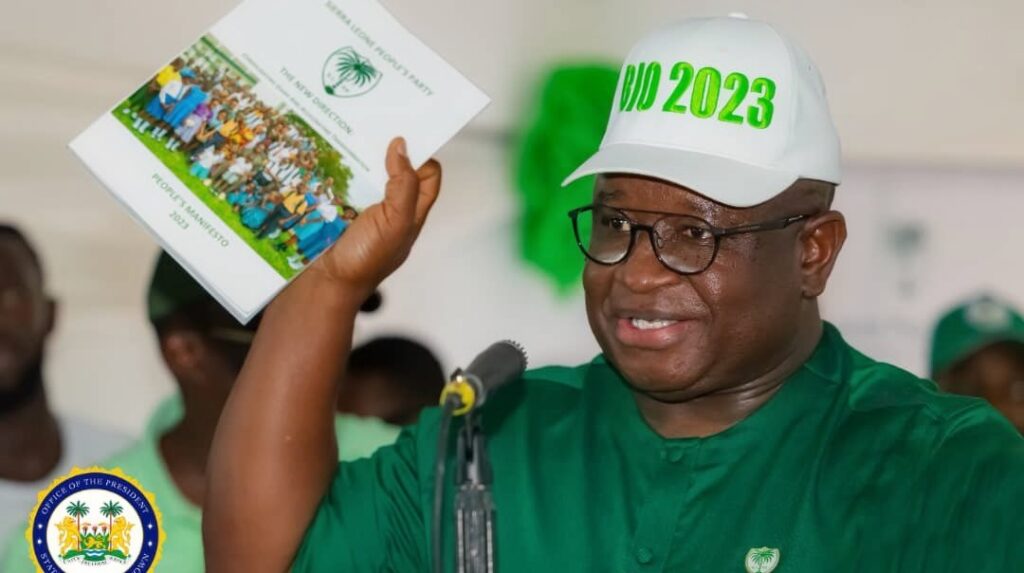Sierra Leone’s political landscape has been dominated by two political parties since independence: The Sierra Leone Peoples Party (SLPP) and the All People’s Congress (APC). Despite towering promises of progress and growth, neither party’s delivery has matched their pledges to deliver sustainable socio-economic development for the complete emancipation and development of the people. Sadly, they have prioritised political rhetoric and regional loyalties over a holistic national development agenda. The consistent pattern of over-promising and under-delivering has left the country grappling with systemic challenges like corruption, ethnic and regional division and a state of abject poverty.
In this article, I delve into the details of the case of overpromises, underdelivery, and deceptions from the incumbent SLPP.
In the few years prior to regaining the seat of power, the Sierra Leone People’s Party (SLPP) deployed perhaps the greatest PR machinery exposing every scintilla of the ills of the then incumbent party, APC. The then opposition candidate, Julius Maada Bio (now president) described the previous APC administration as a “suffocating cesspit of…misrule for yet another five years”. The reality of the failings of the APC government were overwhelmingly stark and so the publicity campaign by the opposition, naturally flew on the high altitude of the despondency of citizens. Maada Bio’s wife, Fatima Bio, a young vibrant Nollywood thespian, had won the hearts of the electorates by her uncharacteristic campaign antics, in part driven by her own peculiar personality and in part, by her theatrical skills. The manifesto of the SLPP dubbed “the people’s manifesto” touted their plans to hew out “a united, peaceful, progressive, dynamic, confident, enterprising and happy nation where the people have unlimited access to jobs, food, education and health services and where there is equal justice and equal opportunity for all.” “Paopa Salone mus beteh” (Sierra Leone will improve by all means) became the buzzwords of the then SLPP opposition party. By the time the SLPP won the 2018 presidential elections after the run-off ballots, their hyper-ventilated change often couched in Gen-Z slanguage had caught the frenzy of many, especially the youth, hungry and desperate for socio-economic uplift.
The hopes of the people were heightened by the rhetorics of the new administration. By the time the SLPP came into power, the economic indicia of Sierra Leone were in shambles, as inflation had risen from 8.5% in 2013 to 18% in 2017; the rice, the staple food, had astronomically shot up from Le.60,000 in 2007 to Le.250,000 in 2017 per 50Kg; fuel prices had jumped up from Le.5,000 in 2014 to Le.7,000 in 2018; the Leone currency had depreciated against the USD by over a hundred percent in the slightly over a decade of the APC administration (from Le.3,000 in 2007 to Le.7,000 in 2018). In addition to the economic catastrophe, the country’s governance had atrophied with reports of corruption and maladministration, being the order of the APC’s agenda for prosperity. The SLPP had their work cut out for them. And the only solution was work and more aggressive work. However, the SLPP chose the new PR-path—(the method which had worked for them—which got them into power) to sloganize and glamorise a few steps into leaps and bounds of a colossus. Little they did realise that some techniques were suited for campaigns only and not for the whirlwind of governance. The creation of the Directorate of Science, Technology and Innovation (DSTI) no sooner the SLPP ascended the dais of governance came as no surprise. The public expectation was that in a few years, the DSTI would revolutionise the governance architecture of Sierra Leone through an exodus from manual procedures to digital governance in all major spheres. However, the DSTI, became overladen with highfalutin promises but miniature deliveries. But the PR kept on expanding. The slogans kept multiplying. There was and is still no letting up.
Radical inclusion has become the fancy phrase of our current governance trajectory. While the jury is still out on the pioneer of both the phrase and concept, it has been engrafted into the current governance by policy and legislation. It was an easy sell to development partners. It was an elegant governance language that promises inclusion for all—who would be opposed to equality and equity? It was beautifully merchandised across the globe as the new governance insignia of the SLPP administration. By its second term, the SLPP’s government aka paopa (by all means) was reported to have recruited Mercury Public Affairs, a top international PR firm to accelerate its PR bidding. It is speculated that the service fees of the said PR firm which the government is reported to have hired is sufficient to meet the energy needs of major hospitals across the country thereby curbing acute maternal and infant mortalities. Aside from the external PR amplification or laundering, whichever part of the spectrum, you are, the government also attracted social media vandals who had cussed out opposition politicians and civil society activists, elevating them into what should be serious communication roles with a clear mandate to drown out opposition and critical voices. For the SLPP government, there’s always an unquenchable thirst to export and showcase their message more than their works. For the SLPP government, it is not by their works that we know them. It is by their cosplaying growth and development and packaging pedestrian ideas as universal development silver-bullets; constructing their own narratives and telling their own stories from their own point of view which is more often than not at variance with the people’s. Telling the world that the people are filled even when they are hungry, that there is light at the end of the tunnel even though they dwell in utter darkness is the genius marketing of the SLPP government. It appears they have clutched onto the old saying that a lie told too many times and elegantly too is soon passed off as the truth. The SLPP can tell a story well. They can paint an irony as reality. They have outsmarted the opposition in the PR game. They have obliterated them. Their slogans are catchy, amusing in the ears and alluring to the eyes of the people.
While the PR machinery continues to be in top gear, its high dividends are numerous awards, some of them bogus; fancy statistics and public lecture opportunities at leading academic institutions for the officials of government. In six years, Sierra Leone’s double-digit inflation has been galloping from a peak of 56% in October 2023 to 36% in May 2024 and now hovering around 12.9%. Commodity prices have risen by two or three folds. While electricity has expanded, supply is non-existent or unreliable as compared to the years prior to SLPP coming into office. Being the self-declared poster child for accountability and open governance in Africa, it seems antithetical that under the SLPP government, the general election’s results of June 2023, although questioned and demanded by the opposition and civil society (including credible international observer groups) have not been disclosed. At home, divisive politics has become the order of the day with the SLPP government at war with the opposition more than it is inviting them on board the governance train. Reports of marginalisation and summary terminations of tenured officials, arrest and threat of arrest of opposition and activists, have become too many to ignore as isolated cases. The judiciary has become a theatre for the SLPP government with removal and appointment of the Chief Justice, done in the very same unconstitutional fashion as their opponents.
In six to seven years, the SLPP has done what it can best do—sloganize their little drops and romanticise their own development. And they have been very prolific and unapologetic about it. While economic conditions shore up the people’s poverty, the SLPP is telling a contradictory story, a narrative that belies the people’s poverty. Sometimes it seems ingenious. But sometimes disingenuous and callous. SLPP may be winning the PR battle against the people’s acute poverty, but it might lose the war at the most crucial hour. Because governance and development are facts and realities which no PR can suppress forever. Like smoke, they would soon come up and reveal the stench.


